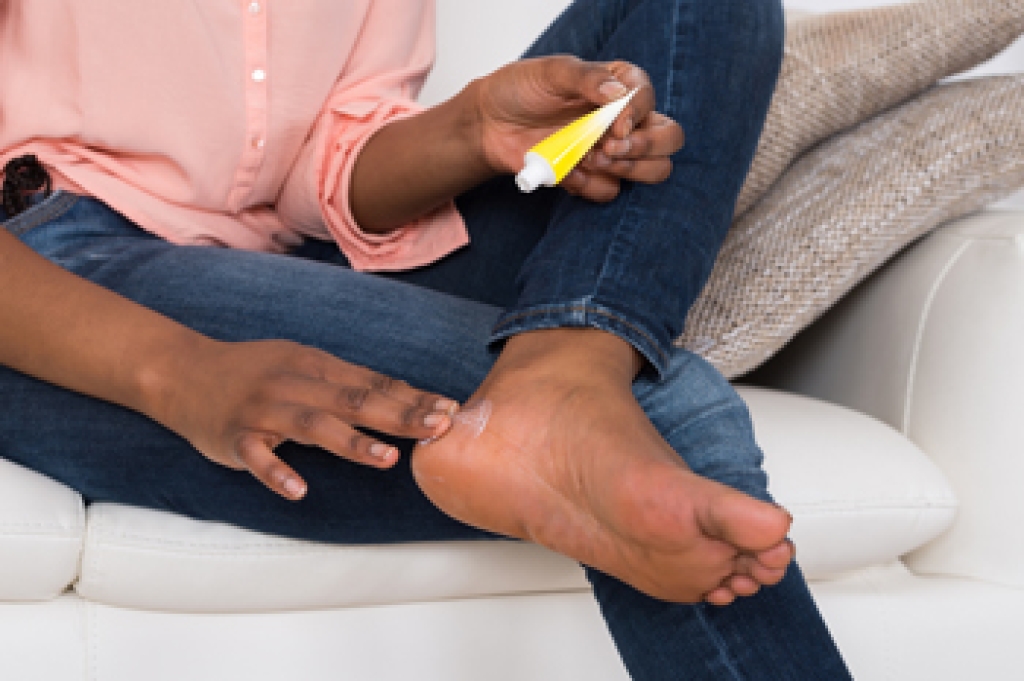 Cracked heels affect up to 20 percent of adults in the United States. Although cracked heels are not usually a major issue, they can become very painful. Common factors that can cause cracked heels include standing for long periods of time, using harsh soaps, walking barefoot, dry skin, and wearing shoes that aren’t supportive. Cracked heels can also be caused by medical issues, such as vitamin deficiencies, fungal infections, obesity, or pregnancy. Common methods to prevent cracked heels include wearing shoes that do support the heel and are not too tight. Tips for relieving cracked heels are to stay hydrated, use a foot cream, and avoid standing for too long in one period. It is suggested that anyone with persistent and painful cracked heels consult with a podiatrist for a proper treatment method.
Cracked heels affect up to 20 percent of adults in the United States. Although cracked heels are not usually a major issue, they can become very painful. Common factors that can cause cracked heels include standing for long periods of time, using harsh soaps, walking barefoot, dry skin, and wearing shoes that aren’t supportive. Cracked heels can also be caused by medical issues, such as vitamin deficiencies, fungal infections, obesity, or pregnancy. Common methods to prevent cracked heels include wearing shoes that do support the heel and are not too tight. Tips for relieving cracked heels are to stay hydrated, use a foot cream, and avoid standing for too long in one period. It is suggested that anyone with persistent and painful cracked heels consult with a podiatrist for a proper treatment method.
Cracked heels are unsightly and can cause further damage to your shoes and feet. If you have any concerns, contact one of our podiatrists from Barry University Foot and Ankle Institute. Our doctors can provide the care you need to keep you pain-free and on your feet.
Cracked Heels
Cracked heels appear unappealing and can make it harder for you walk around in sandals. Aside from looking unpleasant, cracked heels can also tear stockings, socks, and wear out your shoes. There are several methods to help restore a cracked heel and prevent further damage.
How Do You Get Them?
Dry skin is the number one culprit in creating cracked heels. Many athletes, walkers, joggers, and even swimmers suffer from cracked heels. Age and skin oil production play a role to getting cracked heels as well.
Promote Healing
Over the counter medicines can help, especially for those that need instant relief or who suffer from chronic dry feet.
Wear Socks – Wearing socks with medicated creams helps lock in moisture.
Moisturizers – Applying both day and night will help alleviate dryness which causes cracking.
Pumice Stones – These exfoliate and remove dead skin, which allows for smoother moisturizer application and better absorption into the skin.
Change in Diet
Eating healthy with a well-balanced diet will give the skin a fresh and radiant look. Your body responds to the kinds of food you ingest. Omega-3 fatty acids and zinc supplements can also revitalize skin tissue.
Most importantly, seek professional help if unsure how to proceed in treating cracked heels. A podiatrist will help you with any questions or information needed.
If you have any questions, please feel free to contact our offices located in Miami, North Miami Beach, Miami Beach, and Tamarac, FL . We offer the newest diagnostic and treatment technologies for all your foot care needs.
